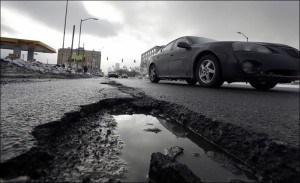WI cities with money in the bank seek taxpayer handout

By Adam Tobias | Wisconsin Reporter
HAND OUT: Some Wisconsin municipalities are asking the state for funding to repair weather-related issues even though many have enough money in their fund balance accounts.
MADISON, Wis. — The Wisconsin Urban Alliance is asking state taxpayers for nearly $12 million for 21 of its cities and villages to offset the costs of a brutal winter.
But most of the municipalities looking for the state crutch already have enough money in emergency funds to pay for the extra expenses.
The subdivision of the League of Wisconsin Municipalities also is considering applying for disaster relief from the Federal Emergency Management Agency, according to Racine Mayor John Dickert, president of the alliance.
“It’s a bailout issue,” Orville Seymer, field coordinator for Citizens for Responsible Government in Milwaukee, told Wisconsin Reporter. “At some point they are going to get a bailout … it’s like welfare, welfare for politicians, and I just don’t buy it. They should be coming up with their own money.”
The 21 communities estimate they spent between $11.7 million to $12.8 million extra this past winter, the fifth coldest of record, to remove snow, fix potholes and repair broken or frozen water mains.
That dollar figure could increase if more cities and villages respond to the League of Wisconsin Municipalities’ survey of extreme winter expenses.
“We’re trying to find any opportunity we can because people are really struggling right now and the cities are really struggling,” Dickert said.
Because extreme winters are not an anomaly in the state, Seymer said local governments ought to plan better for less-than-ideal conditions. Municipalities should be using the money in their fund balance accounts so local dollars are going toward the local projects, Seymer said.
Madison, which reported additional expenses of $2.1 million, had $42.8 million in its unassigned fund balance at the end of 2012, according to the latest available financial statements.
Watertown spent $265,000 more than in previous years, but has more $3 million in its fund balance, Mayor John David said.
Pete Sepp, executive vice president of the National Taxpayers Union, said it’s unfair to state and federal taxpayers when communities don’t pay their own way.
“What if other cities in other states that have hard winters or hurricanes or floods make similar requests? Local Wisconsin residents end up paying for that, too,” Sepp said. “That ends up prompting the question of whether the federal government should be a provider of last resort (in) extreme situations so that we don’t end up getting all this entanglement.”
Sepp also said the federal government should not be viewed as a never-ending source of revenue.
“I used to hear the argument time and again that Washington can afford it because its sovereign credit rating would never be in danger like that of a state or a locality,” Sepp told Wisconsin Reporter. “Well, all of that changed when Washington’s sovereign credit rating was indeed downgraded a couple of years ago.”
Beloit City Manager Larry Arft, president of the League of Wisconsin Municipalities Board, insists that levy limits imposed by the state since 2005 prevent cities from having enough in their budgets to cover the extra costs.
State general transportation aid also has decreased, from $412,073,099 in 2009 to an estimated $403,519,900 this year, Arft said.
“When we have something like this that happens, which creates costs well outside of the normal budget cycle, we have no way of getting money to pay for these things,” Arft said.
Because of the levy limits, Dickert said, some municipalities have been drawing from their fund balances for normal budget needs.
And some local government officials resist using fund balance because it can hurt their city’s credit rating, Watertown’s David said.
“A lot of cities are facing difficulties because they can never raise taxes and they’ve been dipping into their fund balances, and that’s not a good fiscal situation for anyone,” Dickert said.
Several local officials concede they will have to find the tax money locally — from fund balances, budget cuts, borrowing or by delaying certain projects — if they don’t get state or federal help.
“We’re just setting ourselves up for more failures down the road,” Two Rivers City Manager Greg Buckley said.
Peg Schmitt, communications director for the Department of Transportation, told Wisconsin Reporter the state does not have a program targeted at repairing potholes. But she didn’t rule out the possibility of the state releasing the additional funds.
The latest state budget also calls for a 4-percent increase in general transportation aid payments beginning in 2015, Schmitt said.
Contact Adam Tobias at atobias@watchdog.org or follow him on Twitter @Scoop_Tobias







